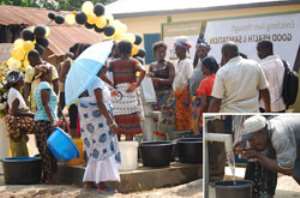
Ghana is among the only four countries in sub-Saharan Africa to be on track to meet the Millennium Development Goal (MDG) for water by 2015, according to the World Bank.
To this end, the Government of Ghana plans to double the capacity of the Kpong intake and water treatment plant to deliver another 40 million gallons of water a day to the Accra metropolitan area.
Recently, Ghana signed an agreement with the Export-Import Bank of China for a $270 million concessionary loan for the project.
Additionally, Ghana has partnered the World Bank to implement a new, $75 million water and sanitation project that would help distribute water, with special focus on the most vulnerable residents in the country.
Furthermore, the World Bank and other partners, including the African Development Bank, the Netherlands, and the Canadian International Development Agency, have been working with the Ghana government to increase access to safe water and improved sanitation such as toilets, sewerage and septic systems, and latrines, in the rural and urban areas.
While 90% of residents of Ghana's capital city, Accra, have access to safe water, only about one-third have drinking water piped into their homes, and even among that group, many get only an irregular supply.
Many households must buy water for flushing and washing from private tankers, and drinking water from private producers. Those with no room to store water, mainly the poor, pay more for it, a World Bank Social Development Specialist, Beatrix Allah-Mensah said.
In the capital, supply simply doesn't meet demand. You can still improve a lot of things in order to have better distribution of water, a World Bank Water and Sanitation Expert, Ventura Bengoechea added.
Ghana was recently declared a middle-income country, based mainly on a rebasing of its economic indicators. Support from the International Development Association (IDA), the World Bank's fund for the poorest countries, and other donors have helped the country reduce poverty and modernise over the last decade.
But, many people remain poor, and important development goals still must be met.
Meanwhile, the Ghana government has pledged that it was going to use revenue from the country's new oil wealth to solve the development imbalances of the country.




 Lay KPMG audit report on SML-GRA contract before Parliament – Isaac Adongo tells...
Lay KPMG audit report on SML-GRA contract before Parliament – Isaac Adongo tells...
 Supervisor remanded for stabbing businessman with broken bottle and screwdriver
Supervisor remanded for stabbing businessman with broken bottle and screwdriver
 NDC watching EC and NPP closely on Returning Officer recruitment — Omane Boamah
NDC watching EC and NPP closely on Returning Officer recruitment — Omane Boamah
 Your decision to contest for president again is pathetic – Annoh-Dompreh blasts ...
Your decision to contest for president again is pathetic – Annoh-Dompreh blasts ...
 Election 2024: Security agencies ready to keep peace and secure the country — IG...
Election 2024: Security agencies ready to keep peace and secure the country — IG...
 People no longer place value in public basic schools; new uniforms, painting wil...
People no longer place value in public basic schools; new uniforms, painting wil...
 'Comedian' Paul Adom Otchere needs help – Sulemana Braimah
'Comedian' Paul Adom Otchere needs help – Sulemana Braimah
 Ejisu by-election: Only 33% of voters can be swayed by inducement — Global InfoA...
Ejisu by-election: Only 33% of voters can be swayed by inducement — Global InfoA...
 Minority will expose the beneficial owners of SML, recover funds paid to company...
Minority will expose the beneficial owners of SML, recover funds paid to company...
 Prof. Opoku-Agyemang has ‘decapitated’ the NPP’s strategies; don’t take them ser...
Prof. Opoku-Agyemang has ‘decapitated’ the NPP’s strategies; don’t take them ser...
